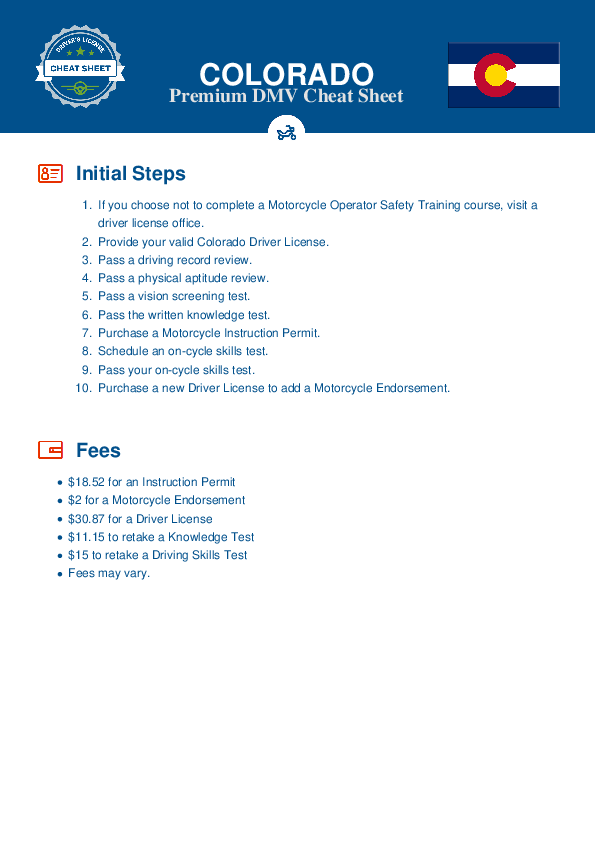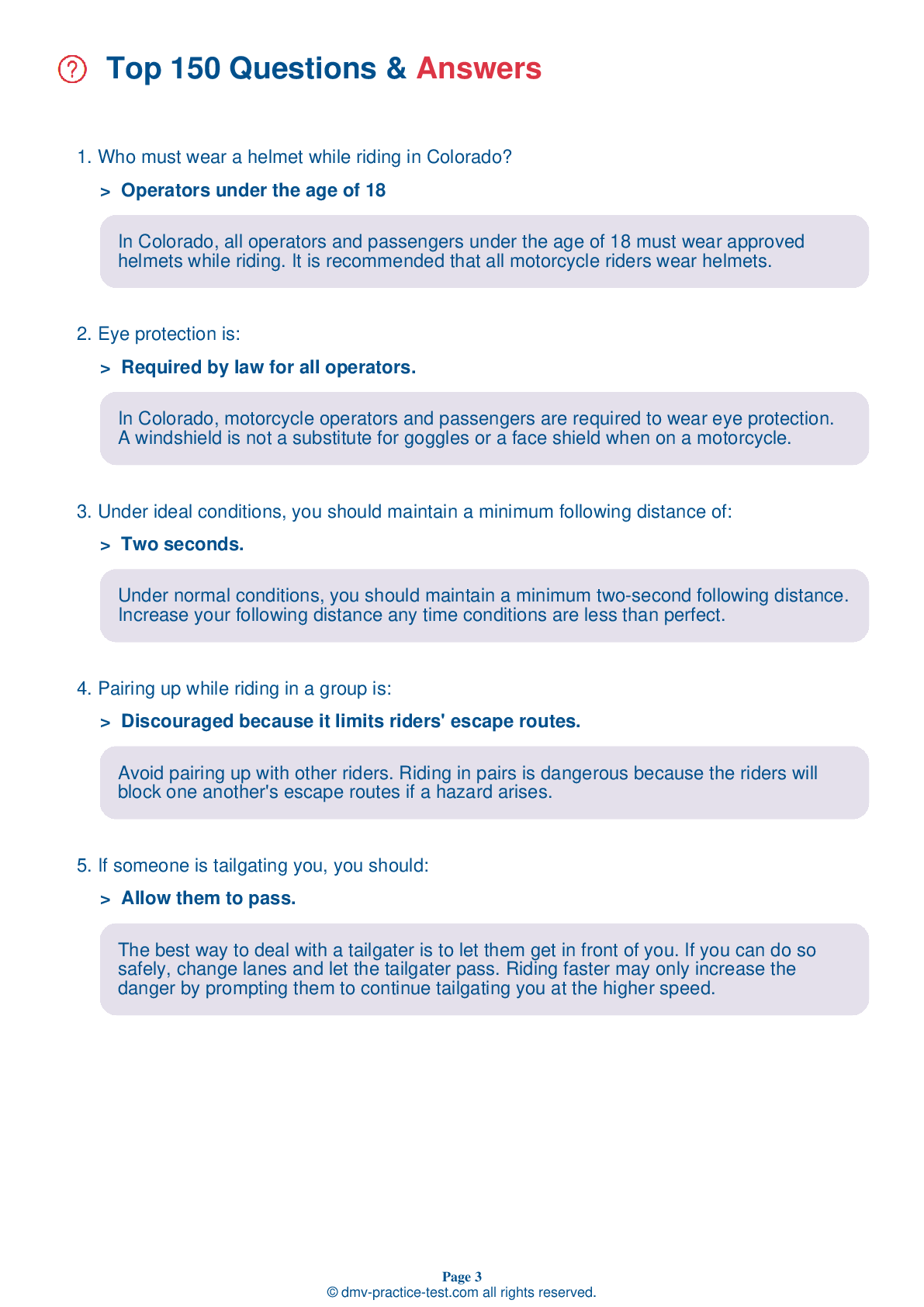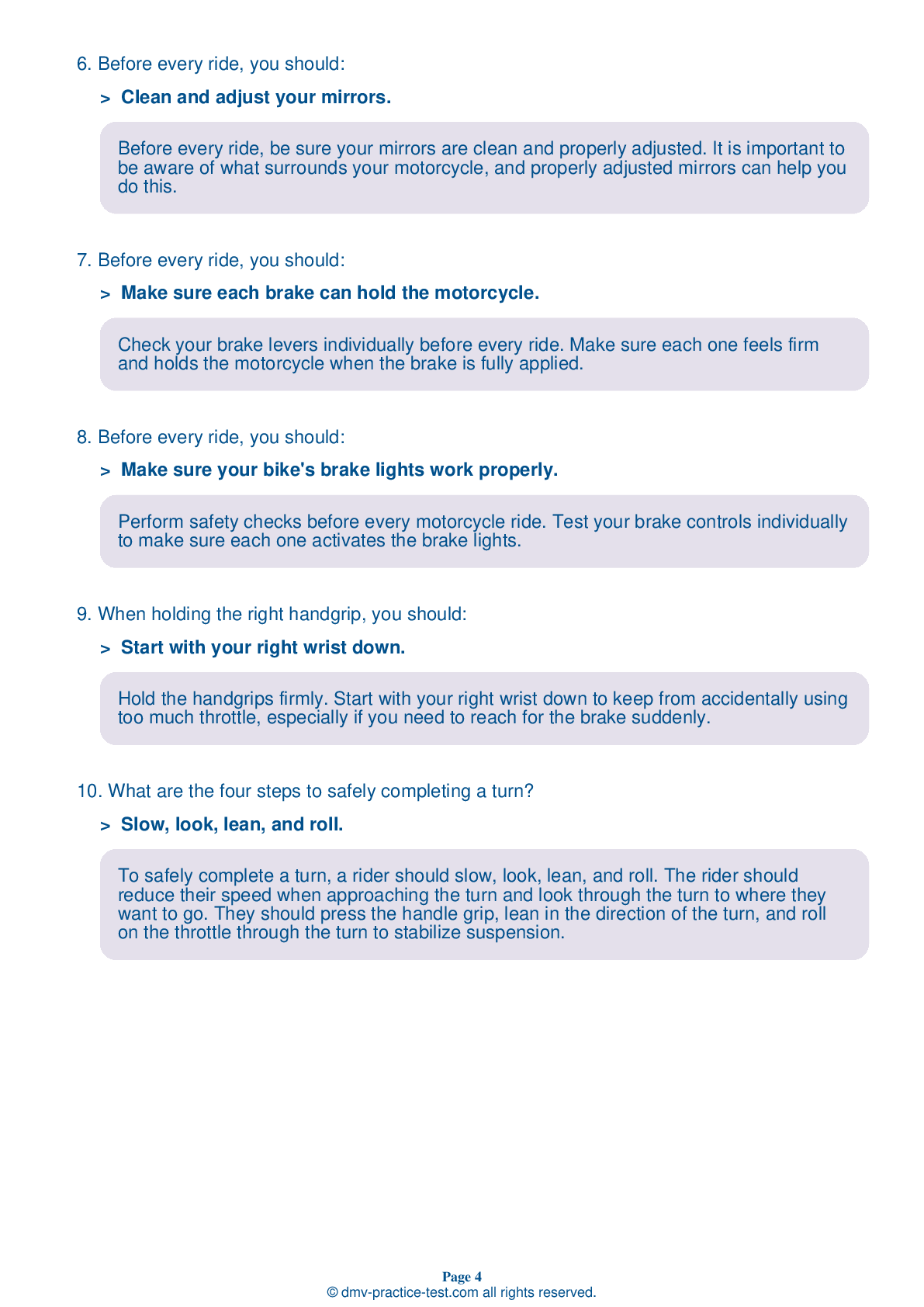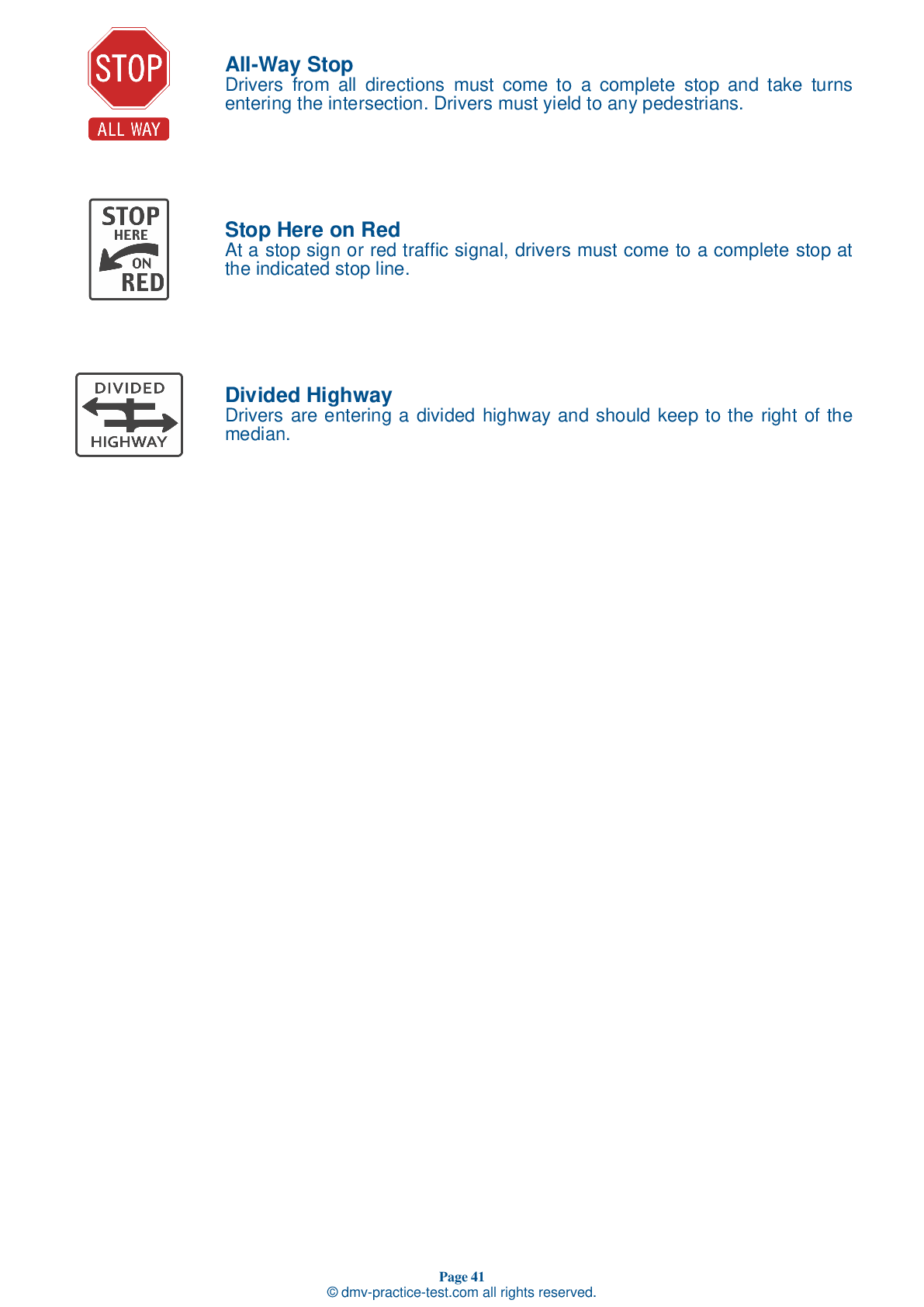DMV Permit Test #4
Motorcycle Test | License CO 2026 | FREE Online Practice! #4 Page 3 of 4
Take this FREE motorcycle test (license in CO 2026) to check your knowledge of the road rules. To improve your results, download a motorcycle handbook online, study theory, and practice for free on our website. Still worried about how to get a motorcycle license in Colorado in 2026? Check our website for more sample tests, train as much as possible, and boost your grades!
25
21
16
13 . When riding near stopped or slow-moving cars, a motorcyclist should:
Not weave between the cars.
Riding between slowed or parked cars can leave you vulnerable to unexpected hazards, such as opening car doors or cars suddenly pulling into traffic. If a hazard arises, you will not have room to safely maneuver. Never travel on the shoulder of a road because other drivers will never expect you to be there.
14 . If your drive chain slips while you are riding, you should:
Immediately pull off the road to fix the chain.
A drive chain that slips or breaks while you are riding could lock the rear wheel and cause your motorcycle to skid. If the chain slips while you are riding, pull off the road and check the chain and sprockets. Tightening the chain may help. If the problem is a worn or stretched chain, or worn or bent sprockets, replace the chain, the sprockets, or both before riding again.
15 . Which of the following is not an example of a slippery surface?
Dry concrete
A number of surfaces can provide poor traction for tires. Wet pavement; roads covered in loose gravel or sand; muddy, snowy, or icy areas; painted lane markings; and metal covers and plates in the road can be more hazardous for a motorcyclist than dry pavement.
16 . The best lane position is:
The one that places you in other vehicles’ blind spots.
A properly chosen lane position should provide a number of benefits, including an increased ability to see others and to be seen. It should help you avoid wind blasts, other drivers' blind spots, and surface hazards. Your lane position should discourage other drivers from trying to share your lane and provide you with an escape route, should a hazard arise. Choose a lane position that maximizes your space cushion.
17 . If no traffic is present when you are taking a curve, it is a good idea to start:
Wherever you prefer.
If no traffic is present when you are taking a curve, start on the outside of the curve to increase your line of sight and the effective radius of the turn. As you turn, move toward the inside of the curve. As you pass the center of the curve and prepare to exit, move back toward the outside position. Remain aware of changing road and traffic conditions and adjust as necessary.
18 . This sign means:
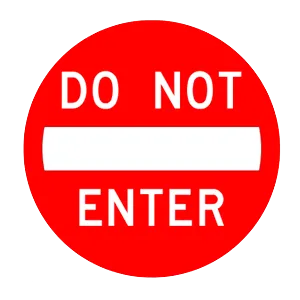
Yield.
This sign means that it is not safe for drivers to enter the indicated road or driveway from their current direction. If you come across one of these signs, you should immediately turn around and drive a different way.
Need Motorcycle Insurance? No problem!
Compare the best rates in Colorado and find a personalized policy that meets your needs.
1. Are You Currently insured ?
2. Married ?
3. Do you own your Home?
4. Have you or a Family Member Honorably Served in U.S. Military ?
5. Your Name
6. Age
7. Zip code
Ranked by best match
2026 Colorado | Frequently Asked Questions
To acquire a motorcycle driver's license in Colorado, you must first pass a written exam to receive a motorcycle instruction permit. After holding the permit for 12 months, you can then take the skills test. Upon passing, you can apply for a motorcycle endorsement on your driver's license. Alternatively, you can complete an approved Motorcycle Operator Safety Training (MOST) course to bypass the skills test.
In Colorado, the minimum age for obtaining a motorcycle driver's license is 16. However, individuals between the ages of 15 and 16 can obtain a motorcycle instruction permit. For those under 18, completion of a Motorcycle Operator Skills Training (MOST) course is required before applying for a motorcycle endorsement or license.
Yes, in Colorado, you need a dedicated license to legally ride a motorcycle. You can either get a motorcycle endorsement (M) added to your existing driver's license, or if you only want to operate motorcycles, you can apply for a "Motorcycle-Only" license. Both require passing written and driving tests or completing an approved training course.
To apply for a motorcycle driver's license in Colorado, you need to provide several documents: proof of your identity (like a birth certificate or passport), proof of your Social Security number, and proof of Colorado residency. If you're under 18, you'll also need a Driver's Ed completion certificate. If you've completed a MOST course, bring your certificate to waive the tests.
Yes, you will need to take a written exam for a motorcycle license in Colorado unless you complete a Motorcycle Operator Safety Training course. The written test covers topics such as traffic laws, safety rules, and best practices for operating a motorcycle. This exam is designed to ensure you have the necessary knowledge to safely navigate Colorado roads on a motorcycle.
The motorcycle written test in Colorado covers a range of topics related to motorcycle operation and safety. These include traffic laws, road signs, safe riding techniques, handling dangerous situations, and motorcycle-specific laws. The test also covers information about protective gear, passenger rules, and the effects of alcohol and drugs on riding ability.
Yes, in Colorado, if you successfully complete a Motorcycle Operator Safety Training (MOST) course, you will not be required to take the written or driving test at the DMV for your motorcycle endorsement. The course provides comprehensive training and upon completion, you receive a certificate which you can present at the DMV.
To enroll in a motorcycle training course in Colorado, you first need to find a state-approved training school. You can do this by visiting the Colorado DMV website. Once you've selected a school, contact them to register for a course. You'll typically need to pay a fee. Courses usually include both classroom instruction and hands-on riding practice. Completion may waive the skills test for licensing.
No, you don't need to possess your own motorcycle for the license test in Colorado. You can use any street-legal, registered, and insured motorcycle for the test. If the motorcycle is not registered in your name, you must have written permission from the owner. Helmet and eye protection are mandatory during the test.
Yes, you can use a friend's motorcycle for the driver's license evaluation in Colorado. However, the motorcycle must be street-legal, registered, and insured. You must also have written permission from the owner if the motorcycle is not registered in your name. Wearing a helmet and eye protection is mandatory during the test.
Yes, the Colorado motorcycle driving test evaluates specific handling skills. These include: left and right turns, sudden stops, swerving or turning quickly to avoid an obstacle, normal stops, starting on a hill, U-turns, and cone weaving. The test ensures riders can safely handle a motorcycle in various traffic conditions and situations.
In Colorado, new motorcycle drivers under 18 must first obtain a motorcycle instruction permit. This permit comes with several restrictions: they cannot carry passengers, they cannot drive on highways, and they are not allowed to drive from dusk till dawn. After holding the permit for 12 months, they can apply for a motorcycle endorsement on their driver's license.
Yes, your Colorado motorcycle license or endorsement is valid across the United States, due to the Full Faith and Credit Clause of the U.S. Constitution. However, when riding in other states, you must comply with their specific traffic laws, which can include helmet and equipment requirements that differ from those in Colorado.
In Colorado, motorcycle helmet laws are age-specific. Riders and passengers under the age of 18 are required by law to wear a DOT-approved helmet. For those 18 and older, wearing a helmet is not mandatory, but is highly recommended for safety reasons. All riders, regardless of age, are required to wear eye protection unless the motorcycle has a windscreen.
Yes, Colorado offers two types of motorcycle licenses. The M endorsement allows you to operate 2 and 3-wheel motorcycles. The 3-wheel (3) restriction is for those who only want to operate 3-wheel motorcycles. To obtain these, you must pass a written test and a motorcycle driving test, or complete a Motorcycle Operator Skills Training (MOST) program.
Yes, in Colorado, you can add supplementary endorsements to your motorcycle license. These include a 3-wheel motorcycle endorsement (M endorsement with a "3" restriction) if you pass the 3-wheel skills test. Remember that each endorsement requires passing additional written and skills tests, and may have specific age and safety course requirements.
Yes, in Colorado, the motorcycle license test is available in several languages other than English. These include Spanish, Korean, and Vietnamese among others. However, it's advisable to check with your local DMV office for a complete list of available languages before scheduling your test.
An effective strategy to prepare for the motorcycle license test in Colorado is to study the Colorado Motorcycle Operator's Handbook thoroughly. This guide covers all the information you'll need for the test. Practice exams are also available online. Additionally, consider taking a motorcycle safety course, which can provide hands-on training and further prepare you for the test.
Yes, in Colorado, the motorcycle written exam can be taken in several languages other than English. These include Spanish, Korean, and Vietnamese among others. However, it's advisable to check with your local DMV office for a complete list of available languages before scheduling your test.
If you don't pass the motorcycle written test in Colorado, you'll need to wait one day before you can retake it. The Colorado DMV allows you to retake the test as many times as necessary until you pass. However, keep in mind that each attempt may require a separate testing fee.
